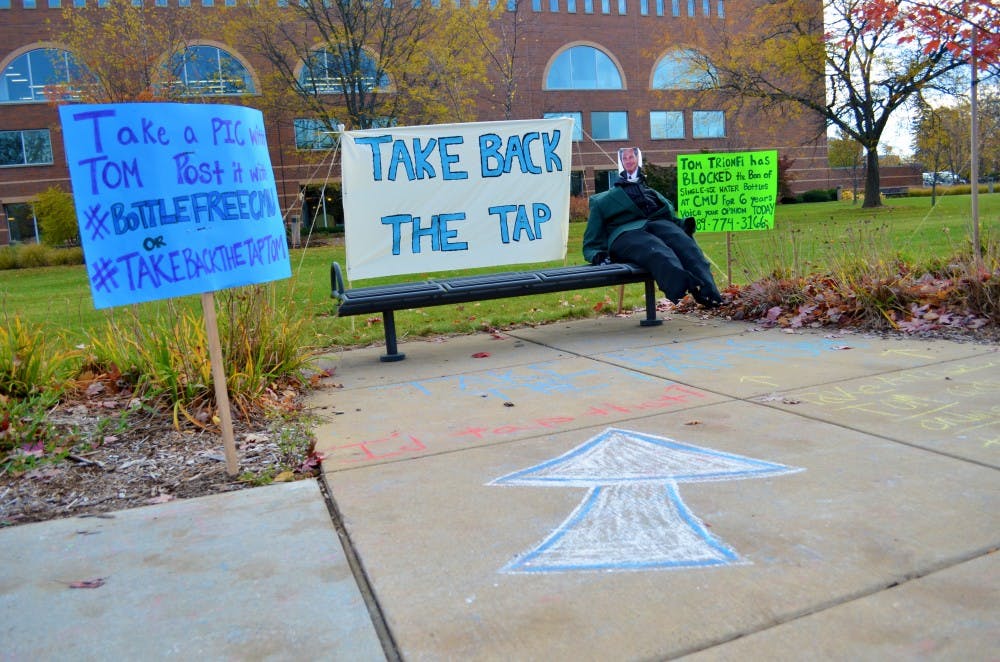Student organization struggles to eliminate bottled water without administration's support
More than 46,000 bottles of water were sold in Central Michigan University's campus stores last year.
Take Back the Tap aims to reduce that number to zero.
"Our main focus is eliminating the sale of plastic bottled water," said president of the registered student organization Lisa Conine.
Founded as an extension of the Student Environmental Alliance, TBtT has been seeking to rid CMU's vending machines of wasteful disposable bottles for the past six years.
Tom Rohrer, former adviser to Take Back the Tap and Director of the Great Lakes Institute for Sustainable Systems, tries to educate students and staff on the danger of plastic waste.
"Water is free," he said. "We have good, clean water that students don't have to waste money paying for."
TBtT spent the week of Nov. 2 canvassing areas on campus to boost environmental awareness among students.

One event was a poster display in the Fabiano Botanical Gardens. In addition to an array of posters, TBtT volunteers erected a statue of Director of Contracting and Purchasing Services Tom Trionfli. The statue was made of plastic water bottles.
TBtT has repeatedly asked for bottled water to be excluded from CMU's contracts with Aramark, Pepsi and Coca Cola. Negotiations between students and the university have yielded no results.
"Ever since the campaign started, numerous meetings and conversations have happened, including letters and emails showing student support," Conine said. "It seems like the conversations always go in a circle. We're not sure if he is willing to negotiate with us."
Beverage companies have no incentive to eliminate bottled water from CMU's lineup, said Trionfi.
"The university has a number of contracts, two are with Pepsi and Coke and the other is with Aramark to run our C-stores. With those contracts, they have the ability to put into their vending the machines and supply to C-stores the types of beverages that people are purchasing. Neither one of them are going to put things in there that aren't selling."
—Tom Trionfi, director of contracting and purchasing services
Almost 500,000 20-ounce beverages were sold in campus stores managed by Aramark from August 2014 to May 2015. Bottled water sales comprised approximately 10 percent of total sales.
"Coke's biggest seller right now is their Dasani water, more than any of their carbonated beverages," Trionfi said. "The university tries to offer to its students things that they will choose when they come here."
In that time frame, sales in Aquafina, Smart Water and Ice Mountain totaled 26,974 bottles, beating out standard Pepsi products by nearly 6,000 bottles.
Trionfi advised TBtT to increase student awareness to reduce bottled water sales. While TBtT has been working to increase public awareness, it hasn't been enough to cause significant change in the sale of bottled water on campus.
"We've had this campaign on campus for six years and you always have to keep educating freshmen and keep members active," said SEA president Audra Flores. "We're trying to tell as many people as possible to have louder student voices in the future."
Flores estimated about 300 students showed their support during the week of events through signatures and listening to TBtT's message. However, students' purchasing power remains geared toward bottled water.

"I don't negotiate on behalf of Tom Trionfi and Take Back the Tap, I negotiate on behalf of the university," Trionfi said.
Conservation Biology Graduate Assistant Grant Clarkson saw the posters and statue while walking between classes. Clarkson tries to keep himself and his students educated on the hazards of plastic waste.
"It affects every single person," he said. "We need to dedicate time to understanding it more thoroughly."
While he agreed with TBtT's goals, he was unsure whether or not plastic water bottles would be eliminated from campus altogether. While Trionfi uses bottle refill stations in Warriner Hall for his own water bottle, plastic water bottles will continue to be sold until a significant amount of the campus population can do the same.
"If (Trionfi) had most of the student body behind it, it would be a reasonable goal," he said. "I'm from near Flint and bottled water was 100 percent necessary for schools when they didn't have clean water."
Negotiations between TBtT representatives and Trionfi continued on Nov. 24.
"(Trionfi) told us he could (end bottled water sales on campus) tomorrow if profits dropped and/or Auxillary Services no longer wanted to stock bottled water," Conine said.
Eliminating bottled water would require an special addendum to CMU's contracts. This can only be accomplished if the community rejects bottled water to a degree that it would no longer be economically viable to sell it on campus.
"They aren't, from my perspective, taking back what I'm trying to say to them, that they really need to get students and people who are buying bottled water to stop," Trionfi said.
Despite the lack of change to water sales over the six years TBtT has been active at CMU, Trionfi believes TBtT has had an impact on campus.
"The reasons you're seeing more refill stations instead of regular water fountains is a part of bringing back awareness," he said.







